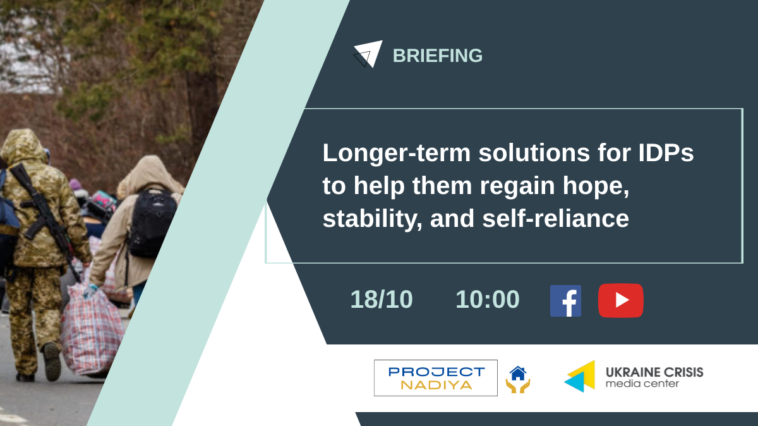While many agencies offer emergency relief to internally displaced people with temporary shelter and food, at this stage of the war longer-term solutions are needed. Project Nadiya offers a comprehensive solution with dignified housing, social adaptation support and employment assistance.
EXISTING CHALLENGES:
1. GROWING HUMANITARIAN AND HOUSING CRISIS: What started as a refugee crisis is now a housing crisis. Almost 8 months into the war, there are over 7 million internally displaced people (IDPs) who are seeking temporary residence in safer areas of Ukraine. These numbers of IDPs are increasing, and the need for housing is dire. Many of the shelters are not going to be habitable when it gets colder.
2. SOCIO-ECONOMIC CRISIS: Having lost homes, jobs, possessions, and displaced for months now, most IDPs are out of savings, out of jobs, and living in difficult, crowded conditions. These people are expected to re-build their lives, and to find jobs while dealing with trauma, isolation, and without access to basic needs. Lack of social adaptation support and employment assistance is leading to greater dependency on humanitarian assistance. In addition, many schools and kindergartens continue to be used as shelter, putting an additional burden on the host communities.
COMPREHENSIVE SOLUTIONS:
At Project Nadiya we believe that in order for IDPs to have a way forward, to become self-reliant members of their community, and to restore their lives they need support with three key things:
– dignified medium-term housing,
– social adaptation support, and
– employment assistance.
And this assistance is desperately needed now, not just when the conflict is over.
Our comprehensive solution comes in 3 phases:
1) Renovation of unused empty buildings as a cost-effective and time-efficient way to provide comfortable, dignified housing with private bathrooms, kitchens and a social space.
2) Resources and programming for social adaptation and cohesion – such as a community center on the premises with a library, a learning center, a café, a childcare room, a playground, and an outdoor gym where IDPs and local community members can interact and feel at home. Programming to include art therapy, psychological support and legal assistance – all done through established partner NGOs.
3) Support with employment assistance through micro-enterprise grants and small business development, professional skills and IT training. This comprehensive approach allows displaced people to regain the strength, stability and independence that they need to have a way forward.
SOCIAL IMPACT: Aside from providing accommodations to people who’ve lost everything, the project will create meaningful social impact in the following ways:
– Employing IDPs directly in the project, (already underway);
– Improving access to jobs, and providing enough strength and stability to look for a job;
– Training IDPs in trade and professional skills that will be transferable;
– Helping kids access local schools so they can learn while parents can work;
– Fostering easier adaptation and integration due to mental health support;
– Restoring incomes to so that individual families and the affected communities do not remain dependent on humanitarian aid;
– Enriching local communities by refurbishing old disused buildings.
IMMEDIATE GOALS: After signing an agreement with the head of administration of Zakarpattia oblast in August we started work on a pilot project near Uzhhorod that will house 100 people per year, provided that we attract sufficient funding. Once the project is successfully completed the model can be replicated throughout the region and the country, with the potential to help thousands.
One of our goals is to create partnerships with likeminded organizations and funding agencies that would like to participate in the project, and to build bridges between funders, communities and those in need, so that support is available where it is needed most.






